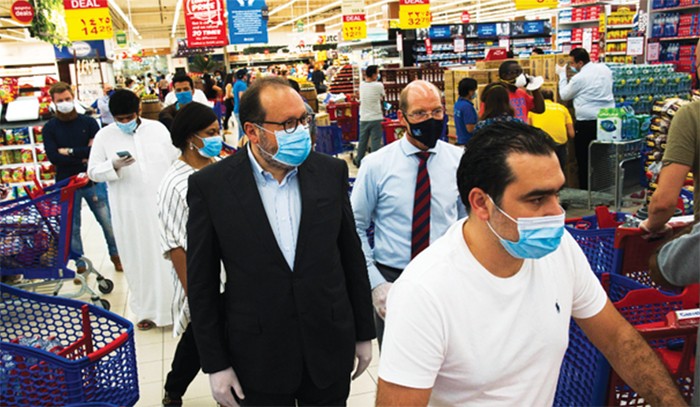As Carrefour hypermarkets are busier than ever, the company that owns the chain says it will not furlough staff
One of the biggest private employers in the Middle East has no plans to cut salaries or lay off any of its 44,000 workers, but the pandemic is changing its thinking about food security, retail and tourism.
Majid Al Futtaim owns and operates hundreds of grocery stores and more than two dozen malls in the Middle East, Central Asia and Africa. In Gulf Arab states, it has more than 19,000 employees, mostly from the Philippines, India, Nepal, Bangladesh and Egypt. The workers’ salaries provide vital income for their families at home.
“We have taken a decision that we are not going to furlough people … and we are not going to touch the basic salaries,” said the Chief Executive Officer Alain Bejjani. “It means a lot, during tough times, to make sure that we are one family and we are dealing with our people in the best possible way.”
Bejjani spoke to The Associated Press from the company’s busiest store, a massive Carrefour hypermarket in Dubai that received 22,000 customers daily before the pandemic. Even amid Dubai’s 24-hour curfew, the store remains busy. Security guards test people’s temperature before entering, and in line with government orders, gloves and masks are worn by all.
The company, named after its Emirati billionaire founder, owns and operates 300 of the French-based Carrefour stores. Its largest markets are the UAE, Saudi Arabia and Egypt, but its reach extends to Pakistan, Kenya and Uzbekistan.
Because the UAE, where the company is based, imports most of its produce, Majid Al Futtaim’s policy of stockpiling a three-month supply of basic goods proved crucial when nervous shoppers rushed to stock up goods .
Then came a massive surge in online grocery orders — Carrefour has seen a 300 percent surge in the UAE, a 700 percent increase in Egypt and a 1,000 percent increase in Saudi Arabia.
“Food security and strategic stock is very important for us,” Bejjani said on Sunday, adding that the company is looking to further increase its stockpile period.
Bejjani said the company is talking to the governments in countries where it operates about food security, particularly because of some delays in the supply chain due to lockdowns and social distancing measures in Europe, and because countries are now keeping more stock domestically.
Bejjani said it’s unclear whether people will come out of this pandemic with the same spending patterns and whether business travel will rebound. What’s clear, he said, is that online shopping and customer experiences in stores are going to matter more than ever.
“People are going to rethink their consumption patterns,” he said.
Carrefour is the company’s most popular brand, but Majid Al Futtaim’s crown jewel is Dubai’s Mall of the Emirates, where the busiest Carrefour branch is located, with its indoor ski slope.
However, lockdowns across the Mideast have shuttered malls, in line with government orders. Only the hypermarkets inside remain open and Bejjani said the company has forfeited rent payments from mall tenants until they reopen.
Last year, a company audit showed Majid Al Futtaim generated $9.6 billion in revenue and earned $1.25 billion in profit before taxes and other costs.
As other arms of the company take a hit, its Carrefour stores are busier than ever. To keep up with demand, the company reassigned around 1,000 of its employees from cinemas and entertainment outlets to its grocery business.
“A big part of our effort today is invested in making sure that we’re in the flow of what’s happening and we understand how things are going to evolve,” Bejjani said.

